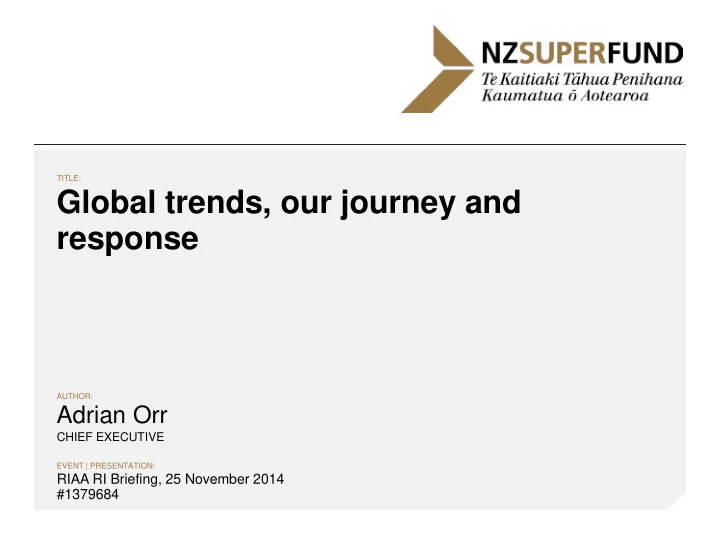

TITLE: Global trends, our journey and response AUTHOR: Adrian Orr CHIEF EXECUTIVE EVENT | PRESENTATION: RIAA RI Briefing, 25 November 2014 #1379684
Long-term investment Long-term: control over capital Good for us – collect illiquidity risk premia, contrarian investing Good for market – smooth functioning of capital markets Good for firms – stable sources of long-term capital Good for society – initiatives are funded that otherwise wouldn’t be But – long-term is HARD It requires: – Governance – Discipline – Steady hands
Global initiatives Inclusive Capitalism – Aims to extend the benefits of the current economic system to more people through economic opportunity, long-term company management and values- led corporate culture World Economic Forum – Long Term Investing Council Focusing Capital on the Long Term – Canada Pension Plan (CPPIB) and McKinsey – Advancing practical actions to focus business and markets on the long term – Practical structures, metrics and approaches United Nations Principles for Responsible Investment OECD Santiago Principles – International Forum of Sovereign Wealth Funds
Regional attitudes Varied levels of interest and commitment
Navigating the changing landscape Trends and issues – which are important and which aren’t? Widespread concerns about Climate change, food security, inequality labour conditions Many developed economies in Pollution precarious financial positions Treatment of stranded assets Developing countries looking Urbanisation to improve outcomes NGO activism Democratisation, autocratic Social media governments Ageing populations, changing economic structural models
Tools for navigating the changing landscape Engagement and investor/corporate dialogue – Constructive engagement good for returns – Wide beneficial impact of corporate practice, regulatory standards, signalling effects better markets Divestment – blunt Investment mandates – Market open to new, flexible mandates with long-term performance indicators Social bonds Smart beta – Better passive access to the exposures we want, but governance and capacity issues Collaboration – The collective might of billions of dollars of long-term capital
‘Ethical’ investing / responsible investing What’s the difference and where does the NZ Super Fund fit in? We are required to have an ethical policy We are a responsible investor because: – we believe that environmental, social and governance factors are material to long term returns – our governing legislation requires us to avoid prejudice to New Zealand’s reputation in the community
Our journey over the last 8 years Constraint Pragmatism Integration Opportunity identification Risk assessments Due diligence Ownership e.g. voting Best Practice / Best Portfolio
Challenges
Our approach to RI issues We take our lead from: – national and international laws – conventions to which the NZ Government is a signatory; and – significant policy positions of the NZ Government We must act consistently with these principles, in order to avoid prejudicing NZ’s reputation as a responsible member of the world community
How we care and act Participated in 518 engagements during 2013/14 No quick fixes Engagement examples Objective Result Oil and gas Management and Engagement is ongoing reporting of ESG risks Climate change Increasing the number % of companies of companies reporting remained similar but on climate change quality of disclosure measures and risk improved management Bribery and corruption Improvements in anti- 15 of 21 companies bribery policies and improved their score on practices bribery and corruption policies
Engage or divest? As a driver for change, divestment is not as effective as analysis and engagement – Analysis – integration of ESG risk into company valuations – Engagement – using shareholder influence to encourage companies to improve their policies and practices Analysis and engagement fundamentally impact a whole-of-market view of a company rather than reallocating share-ownership to other investors through share sales (divestment) Divestment – may impact on the reputation of companies – may make some companies less attractive to some investors – could equally make the shares more attractive to other investors if they believe divestment has led to a mispricing opportunity.
Observations Transparency, transparency, transparency Consistency is vital – on issues, companies, sectors and over time Collaboration is vital – Collective weight of capital when working with others increases our influence – Nevertheless, there are limits to shareholder influence Stick to your principles Think long-term!
Recommend
More recommend